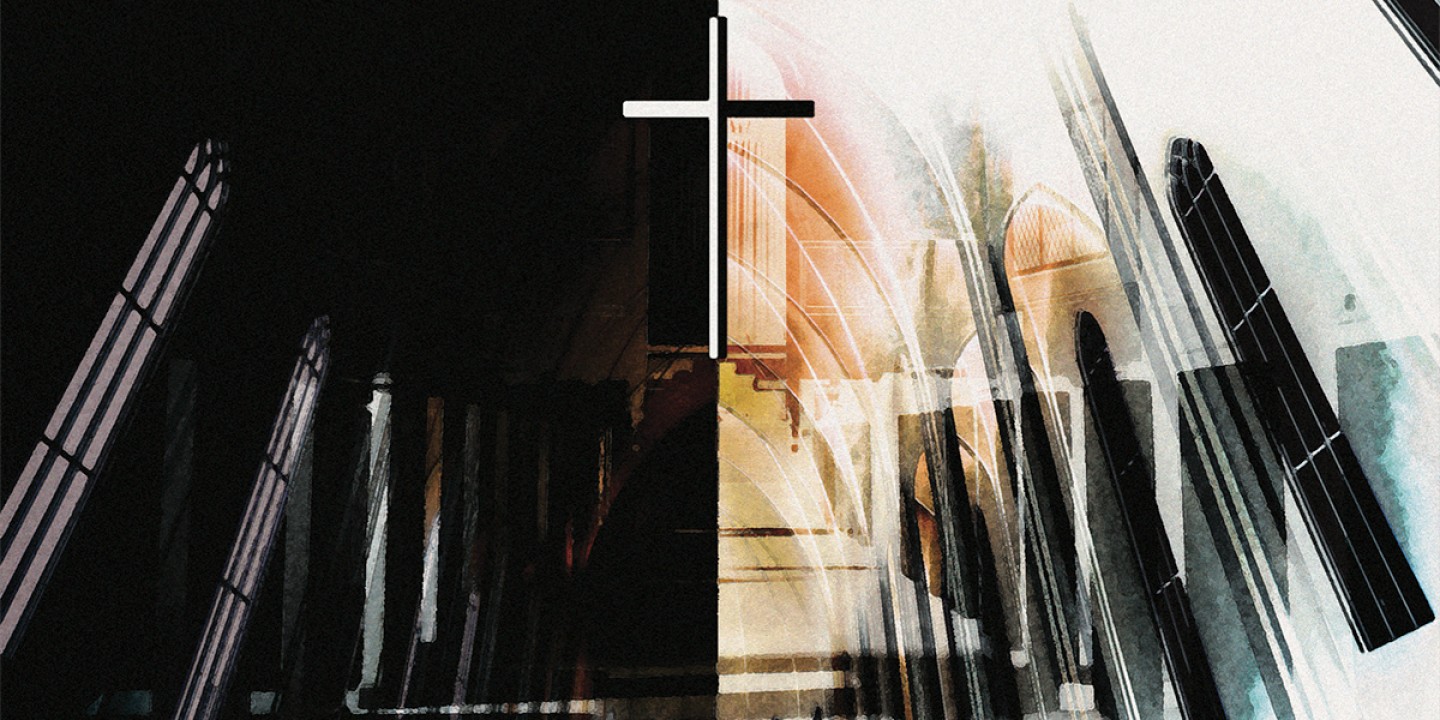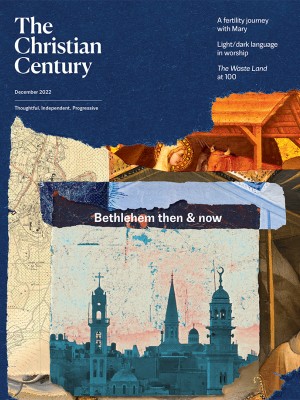Should we avoid liturgical language of light and dark?
While struggling with this question as a church songwriter, I came up with six guidelines.

I write liturgical songs, both music and words, and a few years ago I did a project centered on the Advent, Christmas, and Epiphany cycle. There were many classic themes to explore—hope, waiting, incarnation, joy, gift. There was also one in particular that I soon realized would require some careful consideration: the play of darkness and light.
Many Christians would like to excise light/dark language from our liturgical texts—or at least exclude it from any new ones—and for pretty persuasive reasons. There is a long history in the church of using words like light, white, bright, and fair to connote goodness in a straightforward way and words like dark, black, shade, and dim to connote the opposite. Most instances of such usage were not written for explicitly racist purposes (though some were). Still, this language has thrived alongside racism in White-dominated church contexts. And language—especially ritual language, repeated again and again—has great power among those who speak or hear it, power not constrained by the intent of its creators. So there is a compelling case to simply avoid this whole family of descriptive language at church: it can be and has been used to bolster White supremacy, so it just isn’t worth hanging onto.
Read our latest issue or browse back issues.
Other Christians make the reasonable point that the Bible—our primary text, shared across time and tradition—should be the norm for liturgical language. And the Bible is chock-full of light/dark imagery, with much (though not all) of it presenting light as the positive side of the coin. Jesus is the light of the world, the morning star, the one who obviates the need for lamp or sunlight, the one in whom there is no darkness at all. Forgiveness for sin washes us whiter than snow. And then, over on the other side of things, there’s the power of darkness. Why should the church avoid this language the biblical writers use so freely?
I was aware of both of these arguments when I started writing songs for my project. I found myself tiptoeing up to the language of light and darkness and then stopping short of using it—I was trying to write around the problem, to have it both ways. This was awkwardly transparent; it showed the seams of the songwriting craft and made my ambivalence plain. I realized I needed to take a different approach: to work out how I actually felt about the issue and then develop some songwriting rules to follow.
Yes, praise for the light is all over scripture, and yes, the Bible is our first source of liturgical language. But the Bible says lots of things, and not all of them find their way into our liturgies (or even our lectionaries). Christian views of scripture vary, and I know there are those who maintain that “Is this biblical?” is the main hurdle for any idea or phrase to clear. But I have yet to visit a church that follows this principle through to its logical conclusion, giving every jot and tittle a hearing on Sunday morning. So the mere existence of a light versus dark paradigm in the Bible hardly seems like the last word on its suitability for worship.
After all, the plain fact is that some biblical language can be hurtful to some people among us. It has been used to buttress concrete harm in the past, still is in some places, and even where it isn’t the words themselves can be a significant stumbling block. So while addressing this fact might not be simple or straightforward, we do need to address it. “Deal with it, it’s in the Bible” is inadequate; it fails to take the problem seriously.
So does this mean we should jettison the language of light and darkness entirely? I’m not sure it does. This language, after all, is more than biblical: it’s elemental. It names a fundamental experience of all living things. The earth’s days and seasons are defined by the planet’s relationship with the sun’s rays—their presence and absence, the distance they travel to reach us, and the angle at which they arrive. These cycles of darkness and light have shaped creatures, ecosystems, and communities across generations and continents, and the depth of this shared reality makes it a rich source for liturgical language.
This universal experience of time and of the created order that defines it is fundamental to Christian liturgy. We often overlook this point, reflecting on the specific religious content of our liturgical cycles but not on their very form: an annual calendar, a daily schedule. Ways to mark the time that passes as the earth revolves around the sun while also rotating on its axis to show the sun a continually changing face.
Each year I order a wall calendar from University Hill Congregation in Vancouver, BC. Instead of including a page for each of 12 months, it’s organized by church season: it takes the liturgical calendar, not the Gregorian one, as its starting point. (It also contains beautiful art.) This wall calendar captures well the point that whatever else the church is doing at Sunday worship, at a basic level it’s charting out the year and its seasons—the solstices of extreme light and dark, the equinoxes where they find parity, and everything in between—in a different way than the civil authorities do it.
The tradition of praying the hours does with the day what the Sunday cycle does with the year. The daily office is rich with scripture, and much can be said about the specific content of each of its services. But it is first and foremost a means of keeping time—of charting each sunrise, high noon, and sunset without reference to 24 hours of 60 minutes each. Just ask anyone who has gone on retreat at a monastery and found themselves putting their watch away, relying instead on the church bells’ call to prayer to measure the passing of each day.
In short, Christian liturgy forms us in no small part by defining the passage of time in our lives. This means it is deeply invested in the role of darkness and light in the life of the planet we live on. The challenge I faced in my songwriting project was how to explore light/dark language with care, embracing its richness and depth—while also seeking to avoid the harm it can do. I was and remain convinced that it’s important for writers of liturgical texts to find ways to thread this needle.
I’m considerably less certain that the particular guidelines I came up with are the best available. No doubt there’s much to quibble with and refine here. But here’s what I tried to do as I wrote liturgical songs for Advent, Christmas, and Epiphany, the time of year anchored by the winter solstice:
1) Consider the various senses in which positive language about light is used. Light can mean illumination, vision, transparency, openness, the revealing of secrets—ideas rooted in the physical function and utility of light. Explore these with care. Light can also connote color, complexion, innocence, and even cleanness—more immediately value-laden ideas that can be dangerous, especially when paired with binary language like light/dark. Avoid these.
2) Be especially cautious about negative language for darkness. Yes, it’s logically implicit in positive language about light, and some will argue that there is thus no meaningful difference between the two. But I’m convinced that it also matters what we make explicit, what we say out loud and emphasize and repeat—a point that became clearer to me as I wrote things like song refrains and they echoed in my mind. It is possible to use positive light language—and again, some forms of it are more worthwhile than others—while also taking care not to actively disparage darkness.
3) Ask, in a given situation, if you need to use language about light and darkness at all. Is what you’re saying important to your larger purposes, or are you just trying to pad an illustration or fill out a metrical line? If it is important, is there another way to say it that works just as well? The sort of qualified embrace I’m advocating implies a need to make each usage count.
4) Don’t use black/white language to mean bad/good. Just don’t do it (even though it’s biblical). The racist interpretation is too immediate, too easy to infer. Find another way to say what you want to say.
5) Perhaps most importantly: say positive things about darkness. Fertile soil is dark. A dark sky without light pollution promotes healthy rest and, paradoxically, visibility. Secrets and mysteries aren’t always bad things; their illumination isn’t always good. What’s more, the biblical witness is not unanimously pro-light. In Exodus 20 God occupies a space of darkness, in Genesis 15 God arguably takes the form of darkness, and the psalmist praises the protection provided by God’s shadow. In recent years, Christians have begun to write liturgical texts on such themes. There’s even a new children’s book, God’s Holy Darkness, by Sharei Green and Beckah Selnick. (“Creation began in the dark. . . . Creation is God’s work done in holy darkness.”) We need more of this in the church.
6) Embrace the fact that liturgical images exist in tension with one another. The goal is not a tidy, closed system of what light/dark language is allowed to mean. Our metaphors proliferate, overlap, and sometimes even conflict. This is OK. Here I take my cues from the expansive language movement around God and gender: we need to imagine our way to a longer and better list of ways to use light/dark language in worship, rather than restrict our way to a shorter and safer one.
I’ve found these guidelines useful, but they remain a work in progress. It’s a difficult challenge. Can we eschew liturgical language that reinforces racism while continuing to explore language to praise the God who creates sun and earth and moon, days and seasons and years? I don’t know, but I want to try.






